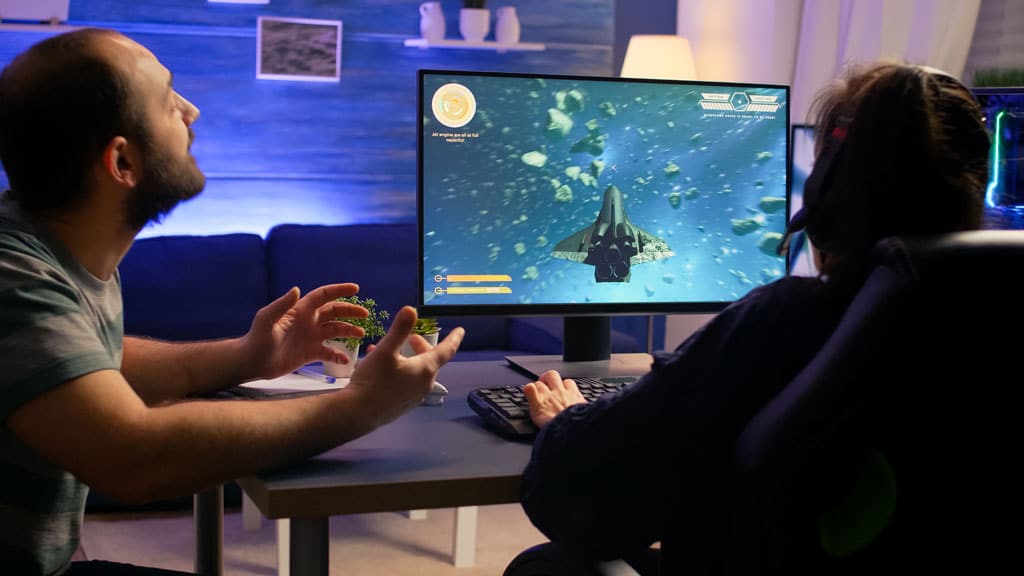Online gaming is a popular pastime for young people and adults. By combining the joy of gaming with text messaging and voice-calling technology, online gaming allows us to socialise with friends and interact with new communities from all over the world.
Like any other hobby, online gaming can improve children’s well-being by introducing them to new experiences, new forms of self-expression, and new ways to exercise their right to play. Online gaming carries some risks for children and young people. One of these risks that may be harder to navigate for both players and parents is “toxicity” in online gaming.
Toxicity is most commonly found in competitive multiplayer online gaming: any game that requires teams of players to compete against each other to win (Aguerri et al., 2023; Mattinen & Macey, 2018).
What is toxicity?
In online gaming, toxicity refers to any behaviour (whether intentional or unintentional) which causes harm to another person
Some terms of toxicity can include:
- Flaming: directing insulting, harassing, or offensive language at another player
- Griefing: acting to disrupt the normal gameplay experience and the enjoyment of other players
- Trolling: acting to intentionally annoy, distress or harm other players
- Sexual harassment
- Hate speech. sexism, racism, homophobia, and ableism
These behaviours – whether they are seen as annoying, intimidating, or distressing can disturb enjoyable gaming experiences and discourage players from gaming. Being targeted by toxicity in online gaming can also be considered cyberbullying, which has a significant and lasting impact on wellbeing.
Recommendations for parents
There are several actions that players and parents can take to tackle toxicity in online gaming and promote positive gaming culture (see PEGI and ESRB guidelines):
Create an open and ongoing dialogue about gaming
In order to support your child in having a positive gaming experience, your child must feel comfortable discussing their gaming with you. Children can be afraid that telling a parent about a negative gaming experience will result in them getting in trouble and losing access to gaming altogether. Having open and positive conversations with your child about gaming empowers them to share both the good and the bad of online gaming with you.
Take an interest in your child’s gaming
By staying curious and expressing interest in your child’s hobby, you encourage your child to share that interest with you. You might watch your child gaming and invite them to talk about the games they play. However, keep in mind that competitive online games are time-sensitive and your child might not want to talk with you while their team-mates are relying on them in-game. You might also play games with your child to understand why they enjoy them so much!
Muting, blocking, and reporting toxicity
Although the specific mechanisms may differ slightly from game to game, competitive online games generally allow you to mute, block, and report other players.
Muting: This prevents other players from communicating verbally with you whilst playing, but you can continue playing with them. In some games, you can mute voice chat but still have the option of communicating with your teammates through text-based chat boxes.
Blocking: If you block another player this means you can no longer play with them online. Blocking a player also prevents them from communicating with you through the game in any way.
Reporting a player: This means that the moderators of the online game will be alerted and the player may be penalised for their behaviour. Each game will have terms of service or community guidelines which players are expected to follow. If a player is found to have violated these guidelines (through abusive language, disruptive play, or other toxic gaming behaviour), moderators can suspend or ban the player from the game.
- Knowing which response is appropriate can depend on the situation your child is in. For example, if the toxic behaviour is being displayed by your child’s offline friends, your child may feel uncomfortable about muting, blocking, or reporting them.
- If you feel that your child is being cyberbullied through online gaming, then you may want to involve your child’s friend(s) and their parents in resolving the issue. You can remind your child that they should be able to have fun while gaming online, and might support them in communicating and expressing boundaries with their friends.
- If you feel that your child is engaging in toxic online behaviours, you may want to discuss this openly with them. It can be helpful to remind them that everyone should be able to enjoy gaming, safely and happily – bullying, abuse, and harassment are no more acceptable online than they are offline.
- Online gaming is one of many digital spaces which provide beneficial opportunities for children, but it can be a particularly challenging space for parents to contend with. It is worth noting that gaming industries are now mandated by national and international policy to take responsibility for gamer experiences.
By creating and maintaining an open conversation on gaming with children, parents can encourage their kids to show, and expect, respect during online gaming.
References
Aguerri, J. C., Santisteban, M., & Miró-Llinares, F. (2023). The Enemy Hates Best? Toxicity in League of Legends and Its Content Moderation Implications. European Journal on Criminal Policy and Research, 29(3), 437–456. https://doi.org/10.1007/s10610-023-09541-1
Kardefelt-Winther. (2017). How Does the Time Children Spend Using Digital Technology Impact their Mental Well-being, Social Relationships and Physical Activity?: An Evidence-Focused Literature Review. https://doi.org/10.18356/cfa6bcb1-en
Kowert, R. (2020). Dark Participation in Games. Frontiers in Psychology, 11. https://doi.org/10.3389/fpsyg.2020.598947
Mattinen, T., & Macey, J. (2018). Online Abuse and Age in Dota 2. Proceedings of the 22nd International Academic Mindtrek Conference, 69–78. https://doi.org/10.1145/3275116.3275149
Nexø, L. A., & Kristiansen, S. (2023). Players Don’t Die, They Respawn: A Situational Analysis of Toxic Encounters Arising from Death Events in League of Legends. European Journal on Criminal Policy and Research, 29(3), 457–476. https://doi.org/10.1007/s10610-023-09552-y
Nielsen, R., & Kardefelt-Winther, D. (2018). Helping Parents Make Sense of Video Game Addiction. In Video Game Influences on Aggression, Cognition, and Attention (pp. 59–69). https://doi.org/10.1007/978-3-319-95495-0_5

